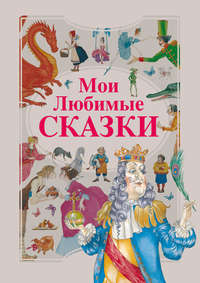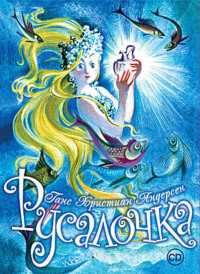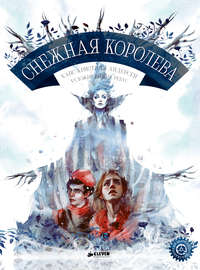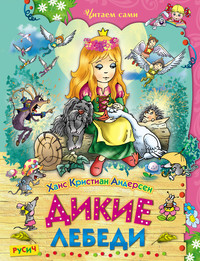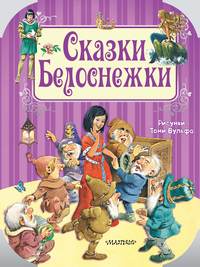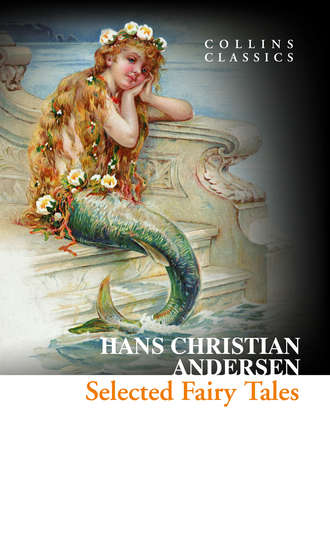
Полная версия
Selected Fairy Tales
Early the next morning the king and queen accompanied the lady and all the officers of the household, to see where the princess had been.
“Here it is,” said the king, when they came to the first door with a cross on it.
“No, my dear husband, it must be that one,” said the queen, pointing to a second door having a cross also.
“And here is one, and there is another!” they all exclaimed; for there were crosses on all the doors in every direction.
So they felt it would be useless to search any further. But the queen was a very clever woman; she could do a great deal more than merely ride in a carriage. She took her large gold scissors, cut a piece of silk into squares, and made a neat little bag. This bag she filled with buckwheat flour, and tied it round the princess’s neck; and then she cut a small hole in the bag, so that the flour might be scattered on the ground as the princess went along. During the night, the dog came again and carried the princess on his back, and ran with her to the soldier, who loved her very much, and wished that he had been a prince, so that he might have her for a wife. The dog did not observe how the flour ran out of the bag all the way from the castle wall to the soldier’s house, and even up to the window, where he had climbed with the princess. Therefore in the morning the king and queen found out where their daughter had been, and the soldier was taken up and put in prison. Oh, how dark and disagreeable it was as he sat there, and the people said to him, “To-morrow you will be hanged.” It was not very pleasant news, and besides, he had left the tinder-box at the inn. In the morning he could see through the iron grating of the little window how the people were hastening out of the town to see him hanged; he heard the drums beating, and saw the soldiers marching. Every one ran out to look at them, and a shoemaker’s boy, with a leather apron and slippers on, galloped by so fast, that one of his slippers flew off and struck against the wall where the soldier sat looking through the iron grating. “Hallo, you shoemaker’s boy, you need not be in such a hurry,” cried the soldier to him. “There will be nothing to see till I come; but if you will run to the house where I have been living, and bring me my tinder-box, you shall have four shillings, but you must put your best foot foremost.”
The shoemaker’s boy liked the idea of getting the four shillings, so he ran very fast and fetched the tinder-box, and gave it to the soldier. And now we shall see what happened.
Outside the town a large gibbet had been erected, round which stood the soldiers and several thousands of people. The king and the queen sat on splendid thrones opposite to the judges and the whole council. The soldier already stood on the ladder; but as they were about to place the rope around his neck, he said that an innocent request was often granted to a poor criminal before he suffered death. He wished very much to smoke a pipe, as it would be the last pipe he should ever smoke in the world. The king could not refuse this request, so the soldier took his tinder-box, and struck fire, once, twice, thrice,—and there in a moment stood all the dogs;—the one with eyes as big as teacups, the one with eyes as large as mill-wheels, and the third, whose eyes were like towers. “Help me now, that I may not be hanged,” cried the soldier.
And the dogs fell upon the judges and all the councillors; seized one by the legs, and another by the nose, and tossed them many feet high in the air, so that they fell down and were dashed to pieces.
“I will not be touched,” said the king. But the largest dog seized him, as well as the queen, and threw them after the others. Then the soldiers and all the people were afraid, and cried, “Good soldier, you shall be our king, and you shall marry the beautiful princess.”
So they placed the soldier in the king’s carriage, and the three dogs ran on in front and cried “Hurrah!” and the little boys whistled through their fingers, and the soldiers presented arms. The princess came out of the copper castle, and became queen, which was very pleasing to her. The wedding festivities lasted a whole week, and the dogs sat at the table, and stared with all their eyes.
The Elf of the Rose
In the midst of a garden grew a rose-tree, in full blossom, and in the prettiest of all the roses lived an elf. He was such a little wee thing, that no human eye could see him. Behind each leaf of the rose he had a sleeping chamber. He was as well formed and as beautiful as a little child could be, and had wings that reached from his shoulders to his feet. Oh, what sweet fragrance there was in his chambers! and how clean and beautiful were the walls! for they were the blushing leaves of the rose.
During the whole day he enjoyed himself in the warm sunshine, flew from flower to flower, and danced on the wings of the flying butterflies. Then he took it into his head to measure how many steps he would have to go through the roads and cross-roads that are on the leaf of a linden-tree. What we call the veins on a leaf, he took for roads; ay, and very long roads they were for him; for before he had half finished his task, the sun went down: he had commenced his work too late. It became very cold, the dew fell, and the wind blew; so he thought the best thing he could do would be to return home. He hurried himself as much as he could; but he found the roses all closed up, and he could not get in; not a single rose stood open. The poor little elf was very much frightened. He had never before been out at night, but had always slumbered secretly behind the warm rose-leaves. Oh, this would certainly be his death. At the other end of the garden, he knew there was an arbor, overgrown with beautiful honey-suckles. The blossoms looked like large painted horns; and he thought to himself, he would go and sleep in one of these till the morning. He flew thither; but “hush!” two people were in the arbor,—a handsome young man and a beautiful lady. They sat side by side, and wished that they might never be obliged to part. They loved each other much more than the best child can love its father and mother.
“But we must part,” said the young man; “your brother does not like our engagement, and therefore he sends me so far away on business, over mountains and seas. Farewell, my sweet bride; for so you are to me.”
And then they kissed each other, and the girl wept, and gave him a rose; but before she did so, she pressed a kiss upon it so fervently that the flower opened. Then the little elf flew in, and leaned his head on the delicate, fragrant walls. Here he could plainly hear them say, “Farewell, farewell;” and he felt that the rose had been placed on the young man’s breast. Oh, how his heart did beat! The little elf could not go to sleep, it thumped so loudly. The young man took it out as he walked through the dark wood alone, and kissed the flower so often and so violently, that the little elf was almost crushed. He could feel through the leaf how hot the lips of the young man were, and the rose had opened, as if from the heat of the noonday sun.
There came another man, who looked gloomy and wicked. He was the wicked brother of the beautiful maiden. He drew out a sharp knife, and while the other was kissing the rose, the wicked man stabbed him to death; then he cut off his head, and buried it with the body in the soft earth under the linden-tree.
“Now he is gone, and will soon be forgotten,” thought the wicked brother; “he will never come back again. He was going on a long journey over mountains and seas; it is easy for a man to lose his life in such a journey. My sister will suppose he is dead; for he cannot come back, and she will not dare to question me about him.”
Then he scattered the dry leaves over the light earth with his foot, and went home through the darkness; but he went not alone, as he thought,—the little elf accompanied him. He sat in a dry rolled-up linden-leaf, which had fallen from the tree on to the wicked man’s head, as he was digging the grave. The hat was on the head now, which made it very dark, and the little elf shuddered with fright and indignation at the wicked deed.
It was the dawn of morning before the wicked man reached home; he took off his hat, and went into his sister’s room. There lay the beautiful, blooming girl, dreaming of him whom she loved so, and who was now, she supposed, travelling far away over mountain and sea. Her wicked brother stopped over her, and laughed hideously, as fiends only can laugh. The dry leaf fell out of his hair upon the counterpane; but he did not notice it, and went to get a little sleep during the early morning hours. But the elf slipped out of the withered leaf, placed himself by the ear of the sleeping girl, and told her, as in a dream, of the horrid murder; described the place where her brother had slain her lover, and buried his body; and told her of the linden-tree, in full blossom, that stood close by.
“That you may not think this is only a dream that I have told you,” he said, “you will find on your bed a withered leaf.”
Then she awoke, and found it there. Oh, what bitter tears she shed! and she could not open her heart to any one for relief.
The window stood open the whole day, and the little elf could easily have reached the roses, or any of the flowers; but he could not find it in his heart to leave one so afflicted. In the window stood a bush bearing monthly roses. He seated himself in one of the flowers, and gazed on the poor girl. Her brother often came into the room, and would be quite cheerful, in spite of his base conduct; so she dare not say a word to him of her heart’s grief.
As soon as night came on, she slipped out of the house, and went into the wood, to the spot where the linden-tree stood; and after removing the leaves from the earth, she turned it up, and there found him who had been murdered. Oh, how she wept and prayed that she also might die! Gladly would she have taken the body home with her; but that was impossible; so she took up the poor head with the closed eyes, kissed the cold lips, and shook the mould out of the beautiful hair.
“I will keep this,” said she; and as soon as she had covered the body again with the earth and leaves, she took the head and a little sprig of jasmine that bloomed in the wood, near the spot where he was buried, and carried them home with her. As soon as she was in her room, she took the largest flower-pot she could find, and in this she placed the head of the dead man, covered it up with earth, and planted the twig of jasmine in it.
“Farewell, farewell,” whispered the little elf. He could not any longer endure to witness all this agony of grief, he therefore flew away to his own rose in the garden. But the rose was faded; only a few dry leaves still clung to the green hedge behind it.
“Alas! how soon all that is good and beautiful passes away,” sighed the elf.
After a while he found another rose, which became his home, for among its delicate fragrant leaves he could dwell in safety. Every morning he flew to the window of the poor girl, and always found her weeping by the flower pot. The bitter tears fell upon the jasmine twig, and each day, as she became paler and paler, the sprig appeared to grow greener and fresher. One shoot after another sprouted forth, and little white buds blossomed, which the poor girl fondly kissed. But her wicked brother scolded her, and asked her if she was going mad. He could not imagine why she was weeping over that flower-pot, and it annoyed him. He did not know whose closed eyes were there, nor what red lips were fading beneath the earth. And one day she sat and leaned her head against the flower-pot, and the little elf of the rose found her asleep. Then he seated himself by her ear, talked to her of that evening in the arbor, of the sweet perfume of the rose, and the loves of the elves. Sweetly she dreamed, and while she dreamt, her life passed away calmly and gently, and her spirit was with him whom she loved, in heaven. And the jasmine opened its large white bells, and spread forth its sweet fragrance; it had no other way of showing its grief for the dead. But the wicked brother considered the beautiful blooming plant as his own property, left to him by his sister, and he placed it in his sleeping room, close by his bed, for it was very lovely in appearance, and the fragrance sweet and delightful. The little elf of the rose followed it, and flew from flower to flower, telling each little spirit that dwelt in them the story of the murdered young man, whose head now formed part of the earth beneath them, and of the wicked brother and the poor sister. “We know it,” said each little spirit in the flowers, “we know it, for have we not sprung from the eyes and lips of the murdered one. We know it, we know it,” and the flowers nodded with their heads in a peculiar manner. The elf of the rose could not understand how they could rest so quietly in the matter, so he flew to the bees, who were gathering honey, and told them of the wicked brother. And the bees told it to their queen, who commanded that the next morning they should go and kill the murderer. But during the night, the first after the sister’s death, while the brother was sleeping in his bed, close to where he had placed the fragrant jasmine, every flower cup opened, and invisibly the little spirits stole out, armed with poisonous spears. They placed themselves by the ear of the sleeper, told him dreadful dreams and then flew across his lips, and pricked his tongue with their poisoned spears. “Now have we revenged the dead,” said they, and flew back into the white bells of the jasmine flowers. When the morning came, and as soon as the window was opened, the rose elf, with the queen bee, and the whole swarm of bees, rushed in to kill him. But he was already dead. People were standing round the bed, and saying that the scent of the jasmine had killed him. Then the elf of the rose understood the revenge of the flowers, and explained it to the queen bee, and she, with the whole swarm, buzzed about the flower-pot. The bees could not be driven away. Then a man took it up to remove it, and one of the bees stung him in the hand, so that he let the flower-pot fall, and it was broken to pieces. Then every one saw the whitened skull, and they knew the dead man in the bed was a murderer. And the queen bee hummed in the air, and sang of the revenge of the flowers, and of the elf of the rose and said that behind the smallest leaf dwells One, who can discover evil deeds, and punish them also.
The Emperor’s New Suit
Many, many years ago lived an emperor, who thought so much of new clothes that he spent all his money in order to obtain them; his only ambition was to be always well dressed. He did not care for his soldiers, and the theatre did not amuse him; the only thing, in fact, he thought anything of was to drive out and show a new suit of clothes. He had a coat for every hour of the day; and as one would say of a king “He is in his cabinet,” so one could say of him, “The emperor is in his dressing-room.”
The great city where he resided was very gay; every day many strangers from all parts of the globe arrived. One day two swindlers came to this city; they made people believe that they were weavers, and declared they could manufacture the finest cloth to be imagined. Their colours and patterns, they said, were not only exceptionally beautiful, but the clothes made of their material possessed the wonderful quality of being invisible to any man who was unfit for his office or unpardonably stupid.
“That must be wonderful cloth,” thought the emperor. “If I were to be dressed in a suit made of this cloth I should be able to find out which men in my empire were unfit for their places, and I could distinguish the clever from the stupid. I must have this cloth woven for me without delay.” And he gave a large sum of money to the swindlers, in advance, that they should set to work without any loss of time. They set up two looms, and pretended to be very hard at work, but they did nothing whatever on the looms. They asked for the finest silk and the most precious gold-cloth; all they got they did away with, and worked at the empty looms till late at night.
“I should very much like to know how they are getting on with the cloth,” thought the emperor. But he felt rather uneasy when he remembered that he who was not fit for his office could not see it. Personally, he was of opinion that he had nothing to fear, yet he thought it advisable to send somebody else first to see how matters stood. Everybody in the town knew what a remarkable quality the stuff possessed, and all were anxious to see how bad or stupid their neighbours were.
“I shall send my honest old minister to the weavers,” thought the emperor. “He can judge best how the stuff looks, for he is intelligent, and nobody understands his office better than he.”
The good old minister went into the room where the swindlers sat before the empty looms. “Heaven preserve us!” he thought, and opened his eyes wide, “I cannot see anything at all,” but he did not say so. Both swindlers requested him to come near, and asked him if he did not admire the exquisite pattern and the beautiful colours, pointing to the empty looms. The poor old minister tried his very best, but he could see nothing, for there was nothing to be seen. “Oh dear,” he thought, “can I be so stupid? I should never have thought so, and nobody must know it! Is it possible that I am not fit for my office? No, no, I cannot say that I was unable to see the cloth.”
“Now, have you got nothing to say?” said one of the swindlers, while he pretended to be busily weaving.
“Oh, it is very pretty, exceedingly beautiful,” replied the old minister looking through his glasses. “What a beautiful pattern, what brilliant colours! I shall tell the emperor that I like the cloth very much.”
“We are pleased to hear that,” said the two weavers, and described to him the colours and explained the curious pattern. The old minister listened attentively, that he might relate to the emperor what they said; and so he did.
Now the swindlers asked for more money, silk and gold-cloth, which they required for weaving. They kept everything for themselves, and not a thread came near the loom, but they continued, as hitherto, to work at the empty looms.
Soon afterwards the emperor sent another honest courtier to the weavers to see how they were getting on, and if the cloth was nearly finished. Like the old minister, he looked and looked but could see nothing, as there was nothing to be seen.
“Is it not a beautiful piece of cloth?” asked the two swindlers, showing and explaining the magnificent pattern, which, however, did not exist.
“I am not stupid,” said the man. “It is therefore my good appointment for which I am not fit. It is very strange, but I must not let any one know it;” and he praised the cloth, which he did not see, and expressed his joy at the beautiful colours and the fine pattern. “It is very excellent,” he said to the emperor.
Everybody in the whole town talked about the precious cloth. At last the emperor wished to see it himself, while it was still on the loom. With a number of courtiers, including the two who had already been there, he went to the two clever swindlers, who now worked as hard as they could, but without using any thread.
“Is it not magnificent?” said the two old statesmen who had been there before. “Your Majesty must admire the colours and the pattern.” And then they pointed to the empty looms, for they imagined the others could see the cloth.
“What is this?” thought the emperor, “I do not see anything at all. That is terrible! Am I stupid? Am I unfit to be emperor? That would indeed be the most dreadful thing that could happen to me.”
“Really,” he said, turning to the weavers, “your cloth has our most gracious approval;” and nodding contentedly he looked at the empty loom, for he did not like to say that he saw nothing. All his attendants, who were with him, looked and looked, and although they could not see anything more than the others, they said, like the emperor, “It is very beautiful.” And all advised him to wear the new magnificent clothes at a great procession which was soon to take place. “It is magnificent, beautiful, excellent,” one heard them say; everybody seemed to be delighted, and the emperor appointed the two swindlers “Imperial Court weavers.”
The whole night previous to the day on which the procession was to take place, the swindlers pretended to work, and burned more than sixteen candles. People should see that they were busy to finish the emperor’s new suit. They pretended to take the cloth from the loom, and worked about in the air with big scissors, and sewed with needles without thread, and said at last: “The emperor’s new suit is ready now.”
The emperor and all his barons then came to the hall; the swindlers held their arms up as if they held something in their hands and said: “These are the trousers!” “This is the coat!” and “Here is the cloak!” and so on. “They are all as light as a cobweb, and one must feel as if one had nothing at all upon the body; but that is just the beauty of them.”
“Indeed!” said all the courtiers; but they could not see anything, for there was nothing to be seen.
“Does it please your Majesty now to graciously undress,” said the swindlers, “that we may assist your Majesty in putting on the new suit before the large looking-glass?”
The emperor undressed, and the swindlers pretended to put the new suit upon him, one piece after another; and the emperor looked at himself in the glass from every side.
“How well they look! How well they fit!” said all. “What a beautiful pattern! What fine colours! That is a magnificent suit of clothes!”
The master of the ceremonies announced that the bearers of the canopy, which was to be carried in the procession, were ready.
“I am ready,” said the emperor. “Does not my suit fit me marvellously?” Then he turned once more to the looking-glass, that people should think he admired his garments.
The chamberlains, who were to carry the train, stretched their hands to the ground as if they lifted up a train, and pretended to hold something in their hands; they did not like people to know that they could not see anything.
The emperor marched in the procession under the beautiful canopy, and all who saw him in the street and out of the windows exclaimed: “Indeed, the emperor’s new suit is incomparable! What a long train he has! How well it fits him!” Nobody wished to let others know he saw nothing, for then he would have been unfit for his office or too stupid. Never emperor’s clothes were more admired.
“But he has nothing on at all,” said a little child at last. “Good heavens! listen to the voice of an innocent child,” said the father, and one whispered to the other what the child had said. “But he has nothing on at all,” cried at last the whole people. That made a deep impression upon the emperor, for it seemed to him that they were right; but he thought to himself, “Now I must bear up to the end.” And the chamberlains walked with still greater dignity, as if they carried the train which did not exist.
The Fir Tree
Far down in the forest, where the warm sun and the fresh air made a sweet resting-place, grew a pretty little fir-tree; and yet it was not happy, it wished so much to be tall like its companions—the pines and firs which grew around it. The sun shone, and the soft air fluttered its leaves, and the little peasant children passed by, prattling merrily, but the fir-tree heeded them not. Sometimes the children would bring a large basket of raspberries or strawberries, wreathed on a straw, and seat themselves near the fir-tree, and say, “Is it not a pretty little tree?” which made it feel more unhappy than before. And yet all this while the tree grew a notch or joint taller every year; for by the number of joints in the stem of a fir-tree we can discover its age. Still, as it grew, it complained, “Oh! how I wish I were as tall as the other trees, then I would spread out my branches on every side, and my top would over-look the wide world. I should have the birds building their nests on my boughs, and when the wind blew, I should bow with stately dignity like my tall companions.” The tree was so discontented, that it took no pleasure in the warm sunshine, the birds, or the rosy clouds that floated over it morning and evening. Sometimes, in winter, when the snow lay white and glittering on the ground, a hare would come springing along, and jump right over the little tree; and then how mortified it would feel! Two winters passed, and when the third arrived, the tree had grown so tall that the hare was obliged to run round it. Yet it remained unsatisfied, and would exclaim, “Oh, if I could but keep on growing tall and old! There is nothing else worth caring for in the world!” In the autumn, as usual, the wood-cutters came and cut down several of the tallest trees, and the young fir-tree, which was now grown to its full height, shuddered as the noble trees fell to the earth with a crash. After the branches were lopped off, the trunks looked so slender and bare, that they could scarcely be recognized. Then they were placed upon wagons, and drawn by horses out of the forest. “Where were they going? What would become of them?” The young fir-tree wished very much to know; so in the spring, when the swallows and the storks came, it asked, “Do you know where those trees were taken? Did you meet them?”


